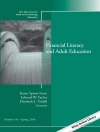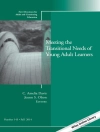The book makes an important contribution to the discourse on student experience in higher education. The book includes chapters that cover important aspects of the 21st century student experience. Chapters cover issues such as: new trends and insights on the student experience; the changing profile of students in higher education and performance measures used to assess the quality of student experience, institutional approaches in engaging students, using student voice to improve the quality of teaching, COVID-19 and its impact on international students, innovative partnerships between students and academic staff, student feedback and raising academic standards, the increased use of qualitative data in gaining insights into student experience, the use of innovative learning spaces and technology to enhance the learning experience, and the potentially disrupting nature of student feedback and its impact on the health and wellbeing of academic staff, and the increased use of social media reviews by students.
Содержание
Chapter 1: The 21st Century Student Experience – Issues, Trends, Disruptions, and Expectations; Mahsood Shah, Anja Pabel and John T. E. Richardson.- Chapter 2: Emerging trends and insights on student experience; David Kane and James Williams.- Chapter 3: People, promise and performance: triangulating student demographics, standards and indicators in a national higher education system; Beverley Oliver.- Chapter 4: Institutional approaches to engaging students in enhancing their experience; Liz Mossop and Joanne Lymn.- Chapter 5: Engaging students as partners in assessment and enhancement processes; Kelly E Matthews and Alison Cook-Sather.- Chapter 6: Transforming spaces and innovative uses of technology to enhance the student learning experience; Paul M Holland and Melanie-Jayne Hainke.- Chapter 7: Improving the quality of teaching; Pieter Spooren.- Chapter 8: How can student experience be used to raise the academic standards of teaching?; Anna Parpala and Telle Hailikari.- Chapter 9: Using text analytics to understand open-ended student comments at scale: Insights from four case studies.- Thomas Ullmann and Bart Rienties.- Chapter 10: Social media and student experience: What do Google reviews say?; Mahsood Shah, Anja Pabel and Ishmael Adams.- Chapter 11: Disruptive trends in student experience evaluations and implications for academic staff wellbeing; Beatrice Tucker.- Chapter 12: Assessing and Enhancing International Student Experience in Australian Higher Education: COVID-19 and A Better Future?; Belle W.X. Lim and Kevin Marco Tanaya.- Chapter 13: Student Experience: Past conclusions and future directions; Mahsood Shah, Anja Pabel and John T. E. Richardson.
Об авторе
Mahsood Shah is a professor and Dean of Swinburne University of Technology, Sydney Campus. In this role, Mahsood provides overall leadership and management of the campus.
John T. E. Richardson is emeritus professor in student learning at the Open University in the United Kingdom. He taught and researched in psychology at Brunel University from 1975 to 2001, when he moved to the Open University to take up a new chair in student learning and assessment in the Institute of Educational Technology.
Anja Pabel is a lecturer in tourism at CQUniversity in Cairns, Australia. Her research interests are: tourist behaviour, marine tourism, humour research and tourism education.
Beverley Oliver is emeritus professor and a Principal Fellow of the Higher Education Academy and an Australian National Teaching Fellow. She is a non-executive director at Open Learning, an ASX-listed company, and non-executive director at Edu Growth, Australia’s not-for-profit acceleration network for high-growth, scalable, borderless education.












